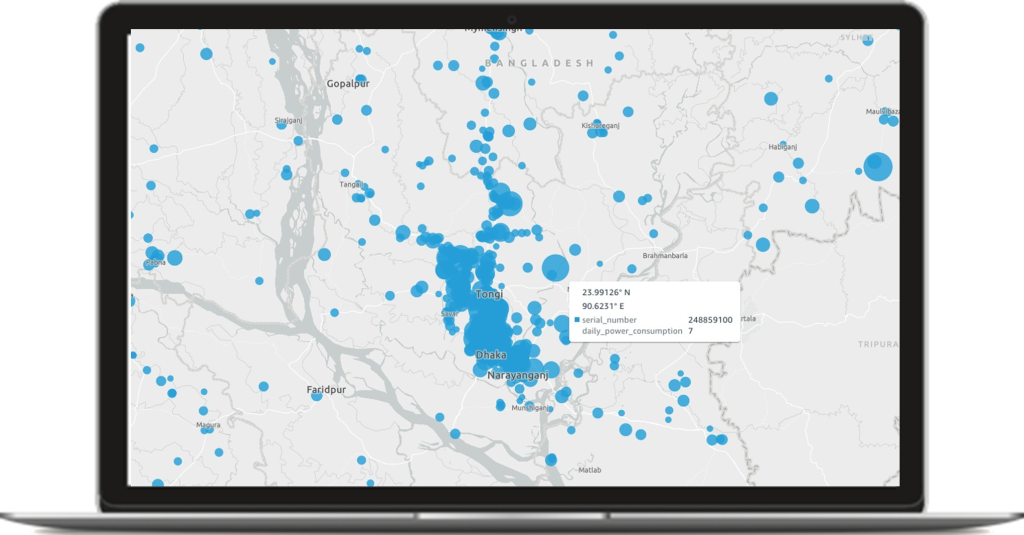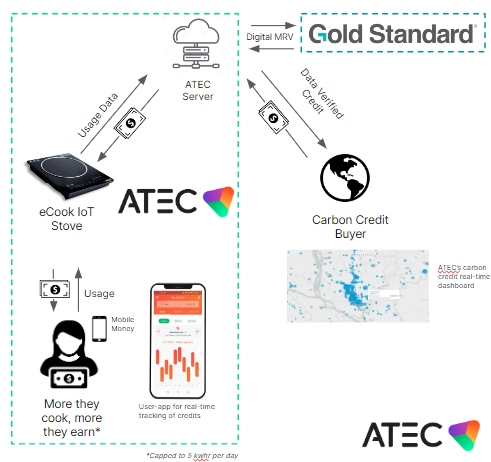- Date
- 3rd November 2022
- Categories
By Dr. Simon Batchelor (Gamos Ltd.; Loughborough University).

Picture – Snapshot of one element of ATEC Real-time carbon credit generation through Gold Standard
Imagine being a household that gets paid to cook your own family meals because it helps climate change. Now imagine that those households are not the rich and wealthy of Europe or the States but are the low and middle income of Bangladesh and Cambodia. Well, this is where our partner ATEC is going with a full scale commercial pilot to be completed within 2023.
As Ben Jeffreys, CEO of ATEC has stated at the Clean Cooking Forum 2022 in Ghana, “the future of carbon credits will be instant digital generation off the device that can then be transacted in real-time to net zero partners globally”.
ATEC has been the first enterprise globally to undertake the new metered verification methodology of Gold Standard to generate data-verified voluntary carbon credits. This was a method that the MECS team, Climate Impact Partners (previously Climate Care) and Gold Standard have worked to develop over the last year. ATEC are the first to apply it in real time.
Indeed, real time data is the key to scalable verification of cookstove carbon credits as well as opening new ways of decarbonising cooking at scale. ATEC’s appliances can see in real time how people are using their induction stoves due to the live data connection available through the GSM global sim within each device. ATEC’s data back-end can then verify that the induction hob that has replaced biomass or LPG stoves, is not just sitting in the kitchen unused, but actually being used daily to cook meals.
Electricity gives a clean kitchen experience to the cook avoiding health harming emissions from biomass, but also avoids emissions harming the environment from the alternatives – biomass (cow dung, wood, charcoal) and fossil fuel LPG. The calculation for the carbon saved takes into account that some electricity is still generated by fossil fuels, but it seems fair to say that most grids are increasing their use of renewable energy technologies.
ATEC’s technology gives 100% visibility on usage which means that carbon payments are 100% linked to actual use. So rather than just selling a stove and with the hope the household uses it, one can see how much a device is being used and directly link that to the carbon payment. That means that those purchasing the carbon can be reassured that what they are paying for is not ‘smoke and mirrors’. It’s not a payment made for the distribution of a stove that barely gets used. Those paying for the carbon can see and verify at any point whether it is being used.
But wait, there’s more.

Figure – diagrammatic representation of passing the carbon credits to the consumer
Given this new horizon of technology capability, why not pass those savings on to the household as a regular payment?
As ATEC can verifiably and accurately see how much a device is being used (and we can), ATEC & MECS are now working together to pilot directly linking an incentive payment to the use of the device, called ‘Cook-to-Earn’. The pilot will measure whether an incentive payment towards decarbonised cooking have a direct impact on usage levels, the more they cook, the more they earn (to a 5kwhr/household limit). Based on the data flow, a payment can be made into the mobile money account of the user. All ATEC customers are already ‘mobile money’ linked with ATEC for their induction hob purchase.
If they were previously paying for their alternative fuels (biomass or LPG) then the acquisition of an ATEC induction hob has likely saved on average 50% of their monthly expenditure on fuel – just because of its efficiencies. The level of savings of course depends on the alternative fuel prices (which always seem to be going up nowadays), and the level of the electricity tariff. Nevertheless, the household will likely be saving money by using an ATEC appliance.
If in addition to that, carbon payments that are passed on to the customer further reduces their monthly expenditure, and gives them an even greater incentive to use the appliance.
But wait, there’s more.
So, are the carbon payments significant enough to households to change behaviour?
As said, payments in Cambodia and Bangladesh do take into account that some of the grid generation is from fossil fuels. Nevertheless, the carbon savings are significant, and the electricity tariff is particularly low in Bangladesh, and not particularly high in Cambodia. The balance of the carbon saved with the low tariff mean that in some cases the household could end up with money in their pocket each month. With ATEC able to secure premium pricing for verifiable, real-time carbon credits with high SDG Benefits and additionality, carbon payments could cover from 22% to 100% of the cost of electric cooking depending on the grid electrification rate. This could be the major disruptive force to the cookstove market by specifically rewarding the right behaviour in a verifiable, scalable manner.
The switch away from polluting fuels to clean induction would mainly be in low and middle income households, and so for those households to have their energy costs covered by carbon payments would be a huge incentive for scaled uptake. If it’s a partial covering of energy costs then that alone will make a huge difference to families in this era of rising energy prices, but if the anticipated prices given for premium credits are secured, we could see households walking away from their smoke-free daily meal having cooked for free or potentially even making a profit.
The idea that we could scale modern cooking while at the same time mitigate climate change is exciting. MECS and ATEC are working on this now with ATEC looking to work with distributors across Asia & Africa with their sector-changing product, so watch for an updated blog in 6 months’ time.
Featured images: Images by ATEC